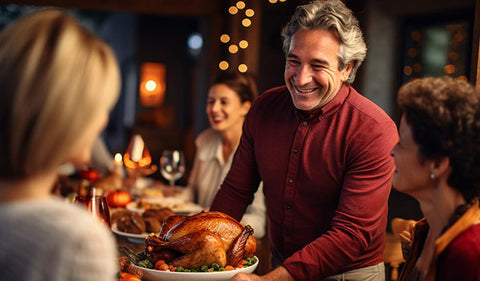Stress eating isn’t merely about willpower; a complex web of psychological and physiological factors are involved. If you find yourself unable to stop reaching for the jar of cookies or bag of chips, know that you’re not alone. Did you know your brain signals you to raid the pantry under pressure? It’s true, and we’ll be talking about that in-depth in this blog.
However, you don’t have to stress eat whenever you feel the urge to. In this blog, we’re unraveling the mystery of stress eating and exploring strategies for managing stress and its impact on your diet.
Whether you’re currently dealing with stress, curious about the science behind stress eating, or want to know what stress eating symptoms to look out for, you’re in the right place. Keep reading to learn everything you need to know.
What is stress eating?
Stress eating and emotional eating are often used interchangeably, even though they’re not the same. In this blog, we’re defining stress eating as consuming food because you’re stressed out or feeling emotional discomfort. You’re eating in response to these feelings instead of from hunger cues.
Regular hunger is a physiological response to the body’s need for nutrients. It gradually builds over time; a variety of foods satisfy this hunger. You’ll notice regular hunger when your stomach growls, you feel tired, or you’re irritable from not eating for a long time.
Stress eating is an impulsive response to your emotional needs or stress. It’s different from physical hunger. While various foods will fill you up when you’re hungry, you’ll like having cravings for foods with lots of sugar or fat. Satisfying those cravings provides a temporary sense of relief or distraction from what’s bothering you. However, this satisfaction is only temporary.

The psychology behind it
When you’re stressed out, your body releases cortisol, a hormone that increases your appetite and heightens cravings for comfort foods – the ones that are usually high in sugar or fat. These foods stimulate your brain’s reward center, providing the temporary relief we mentioned.
Certain foods — especially those rich in carbohydrates, trigger serotonin, a neurotransmitter that boosts your mood and creates a temporary feeling of well-being. This makes high-carb, savory foods feel particularly comforting when you’re stressed out.
It is possible for stress eating to become a learned behavior or conditioned response. If you repeatedly turn to food for comfort during stressful times, it will become an automatic response if you feel stressed.
This is because of immediate gratification, distraction, and cultural and social influences. Allow us to explain.
When you’re stressed out, you tend to seek immediate gratification. Comfort foods provide that, along with a sense of pleasure and relief, making them your go-to.
Eating often serves as a distraction from stressful thoughts or feelings. Eating, especially foods you enjoy, momentarily diverts your attention away from the source of stress.
Societal norms and cultural habits also play a role. In many cultures, food is a focal point for social gatherings and celebrations, and it’s often associated with comfort and care. This often reinforces using food as a coping mechanism in times of stress.
The impact of stress on diet choices
Stress impacts your dietary choices and has short-term and long-term effects on your dietary habits. As we mentioned earlier, you'll crave high-sugar, high-fat foods because of the cortisol your body releases when you’re stressed. The more often you get stressed, the more you’ll crave these foods.
In the short term, you might find yourself eating impulsively or over-consuming high-calorie foods. Eating under stress disrupts your digestive process, leading to bloating or indigestion. And because high-sugar, high-fat foods lack nutrients, you might have nutrient deficiencies if you don’t maintain a balanced diet.
In the long term, repeated stress eating leads to a sustained calorie surplus, resulting in weight gain and increasing your risk of obesity. If you eat unhealthily for a long time, you’ll face an increased risk of type 2 diabetes, heart disease, and certain cancers. Persistent stress eating might also lead to disordered eating patterns.
Recognizing stress eating symptoms and patterns
Recognizing stress eating symptoms and patterns will help you manage when you stress eat. By identifying personal patterns and understanding common triggers, you can develop strategies to cope more effectively. Here's a detailed look at how to recognize these patterns:
Track your eating habits
Keep a food diary for a couple of weeks. Record what and how much you eat and your emotional state when you were eating. Look for patterns that link eating with certain emotions or stressors. Becoming aware of when you emotionally eat is the first step to taking control of it.

Assess your emotional state before eating
Before you start eating, pause and assess your emotional state. Are you eating because you’re truly hungry, or are you trying to soothe an emotion like stress, anxiety, or sadness? Note that it is possible to genuinely feel hungry while you are also stressed out, but they are different in many cases.
Notice your food choices
Observe the types of food you crave when you feel stressed. Take note if they’re high in sugar, fat, or salt instead of healthier options. As we’ll discuss later in this blog, it’s a great idea to swap out more nutritious options to satisfy those cravings without compromising your health.
Common triggers that lead to stress eating
While we all have different things that stress us out, there are common themes you might notice:
- Work-related stress – think of deadlines, work overload, or conflicts.
- Feeling lonely, sad, anxious, or bored prompts stress eating as a coping mechanism.
- Social gatherings with lots of food might trigger overeating, particularly if you have social anxiety.
- When you’re tired, you’re more likely to experience cravings.
- Traveling or celebrating holidays can lead to erratic eating patterns and stress eating.
Here’s a helpful self-assessment checklist for stress eating:
- Do I often find myself eating without being physically hungry?
- Do I frequently crave specific types of food when I'm stressed?
- Do I eat more rapidly or mindlessly when I’m feeling emotional pressure?
- Do feelings of guilt or regret often accompany my eating?
- Do I use food as a coping mechanism when facing challenging situations?
- Am I experiencing sudden weight changes that correlate with periods of stress?
- Do I tend to eat alone or secretly when stressed?
- Is my stress eating affecting my social life, work, or overall well-being?
Strategies to combat stress eating
To manage your stress, you’ll need a combination of practical strategies, healthier alternatives, and a better relationship with food.
Identify your triggers
Start by identifying situations or emotions that trigger stress eating. This could be anything from work pressure to personal challenges.
Develop other coping strategies
Find alternative ways to deal with stress that don’t involve food. This could be exercise, meditation, journaling, a hobby, or taking a few deep breaths.

Create a mindful eating environment
Eat without distractions like TV or smartphones. Focus on your food, enjoy each bite, and listen to your body’s signals of fullness.
Plan your meals and snacks
Having a meal plan will help you avoid impulsive eating. Include healthy snacks in your plan to prevent sudden hunger pangs that could lead to stress eating.
Drink plenty of water
Sometimes, we mistake thirst for hunger. Drinking enough water throughout the day will help you manage hunger and reduce your likelihood of stress eating.
Now, while you can’t control what your body craves, you can decide which cravings to satisfy and which to find healthier alternatives for.
For example, if you’re craving sweets, opt for fresh fruit, yogurt with honey, or a small piece of dark chocolate instead of reaching for candy or cookies. Instead of chowing down on chips or pretzels, try air-popped popcorn, nuts, or a small serving of cheese. Go for carrot sticks, celery, or cucumber slices if you want some crunch. Pair them with hummus or a healthy dip for added flavor.
Another option is to choose healthier versions of your favorite sweets. There are low-sugar, low-fat, and low-carb options of the same comfort foods that won’t impact your body as much.
Tips for developing a healthier relationship with food
There are several ways to develop a healthier relationship with food. Practicing gratitude, avoiding “good” or “bad” food labels, listening to your body, and seeking professional guidance if you need it will all help you transform your relationship with food so that cravings are merely a physiological response you have rather than something that controls your life.
You'll effectively combat stress eating by combining these strategies, healthier alternatives, and a positive approach to food. It's about making conscious choices, understanding your body's needs, and finding healthy ways to cope with life's stresses.
Lifestyle changes to reduce stress

Did you know that making simple lifestyle changes often makes a significant impact? Exercise, meditation, sleep, a healthy diet, and effective time management reduce stress levels and reduce how much cortisol your body produces. Let’s take a closer look.
- Physical activity is a powerful stress reliever. It releases endorphins, which are natural mood lifters. Even a daily 30-minute walk will significantly reduce stress.
- Meditation and mindfulness help center your thoughts and calm your mind, reducing stress. Techniques like deep breathing, guided imagery, or mindfulness meditation can be particularly effective.
-
Lack of sleep exacerbates stress and leads to poor eating habits. Get at least 7-9 hours of quality sleep each night. Developing a bedtime routine that promotes relaxation, such as reading or taking a warm bath, is a good idea.
- Eating a diet rich in fruits, vegetables, lean proteins, and whole grains will positively affect your mood and energy levels, naturally reducing stress.
- Learning to manage your time effectively will reduce your stress levels. Prioritize tasks, set realistic goals, and take breaks when you need to.
When to seek professional help
If stress overwhelms you to the point where it affects your quality of life, it’s a good idea to talk to a professional. A psychologist or therapist will help you develop coping strategies to manage stress. A registered dietitian provides guidance on healthy eating habits.
Talking one-on-one with a therapist, psychologist, or dietician helps. But group settings are often extremely helpful, too. Talking with others who are going through the same thing is therapeutic.
Long-term strategies for healthy living
We can’t express enough how important it is to nurture your mental and physical wellness. Physical and mental health are deeply interconnected. A balanced diet improves mental health by stabilizing your mood, reducing your stress levels, and enhancing your cognitive function. And good emotional health fosters a positive relationship with food, leading to better nutrition choices.
By taking care of both, you’ll prevent a range of chronic diseases, support your physical health, and reduce the risk of mental health disorders. Integrating healthy eating habits with regular physical activity, adequate sleep, and stress management techniques creates a well-rounded approach to health. This synergy is essential for long-term health and well-being.
Beyond preventing illness, nurturing yourself enhances your quality of life, too.
Manage stress eating with WiO SmartFoods.
If you're looking to transform how you manage stress and its effects on your diet, WiO Smart Foods offers a pathway to healthier choices. You can satisfy your cravings without all the sugar, fat, and salt most comfort foods contain. We offer healthy chips, croissants, cookies, pies, muffins, and more.
Our range of products is designed to satisfy your cravings without guilt, perfectly aligning with your wellness goals. We achieve this by blocking carbs and fat so your body won’t digest them.
Visit WiO Smart Foods to discover a world of nutritious, delicious options that cater to your health and taste buds. From snacks that curb those stress-induced cravings to meals that keep you feeling fuller and more energized, we’ve got your back.
Your journey to a balanced diet and a happier, less stressed you begins with a simple click. Head over to WiO Smart Foods now and take the first step!




